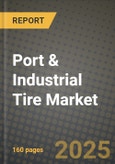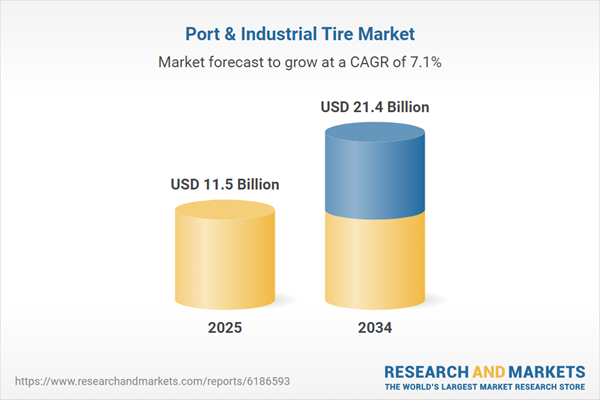The global port and industrial tire market is expanding steadily, driven by increasing demand for heavy-duty tires in logistics, warehousing, construction, and port operations. These specialized tires are designed for material handling equipment, including forklifts, container handlers, reach stackers, and terminal tractors, ensuring durability, stability, and enhanced load-bearing capacity. As global trade and e-commerce continue to rise, efficient port operations and industrial supply chains require robust tire solutions that can withstand extreme loads and harsh working environments. Additionally, the shift toward automation in ports and industrial facilities has led to the demand for high-performance, puncture-resistant tires that support autonomous and electric material handling equipment. The growing emphasis on fuel efficiency, sustainability, and cost reduction is also driving innovations in tire technology, including airless and solid rubber tires that minimize downtime and enhance productivity.
The port and industrial tire market witnessed several key developments, particularly in material advancements and sustainability initiatives. Manufacturers introduced high-durability rubber compounds and reinforced sidewall designs to extend tire life and reduce replacement frequency. The adoption of non-pneumatic and solid tires gained momentum, reducing the risks of punctures and blowouts in high-intensity applications. Additionally, port operators and warehouse managers increasingly prioritized tire pressure monitoring systems (TPMS) and IoT-enabled smart tires, enabling real-time monitoring of tire wear, pressure, and temperature for optimized performance and safety. The trend toward electrification in material handling equipment also influenced tire development, with low-rolling-resistance tires being designed to improve energy efficiency in battery-powered vehicles. Meanwhile, regulatory pressure on carbon emissions prompted manufacturers to invest in eco-friendly materials, including recycled rubber and biodegradable compounds, to support sustainability goals in industrial and port operations.
The port and industrial tire market is expected to see further advancements in smart tire technologies, automation compatibility, and sustainability. AI-driven predictive maintenance systems will become more prevalent, helping businesses reduce unexpected downtime and maintenance costs. The continued expansion of global trade and port infrastructure projects, particularly in emerging economies, will fuel demand for heavy-duty, long-lasting tires capable of withstanding high-load operations. Additionally, the growing adoption of hydrogen and electric-powered industrial vehicles will drive innovations in tire compounds that enhance energy efficiency and traction. Circular economy initiatives will push for increased recycling and retreading of industrial tires, reducing waste and promoting cost-effective tire solutions. With increasing investment in automated warehouses and smart ports, tire manufacturers will focus on developing AI-integrated, self-monitoring tires to enhance operational efficiency and safety in industrial environments.
Key Insights: Port & Industrial Tire Market
- Adoption of Smart Tires and IoT-Enabled Monitoring: Industrial and port tires are increasingly integrated with IoT technology, providing real-time data on pressure, temperature, and wear, optimizing fleet management and safety.
- Rise of Solid and Non-Pneumatic Tires: Puncture-proof solid tires are gaining popularity in heavy-load applications, reducing downtime and maintenance costs while improving reliability in industrial and port operations.
- Growth in Electric and Hydrogen-Powered Equipment: The shift toward sustainable energy in material handling and port vehicles is driving the demand for tires with low rolling resistance and high energy efficiency.
- Increased Focus on Tire Sustainability and Recycling: Manufacturers are developing retreadable and recyclable industrial tires, using sustainable rubber compounds to reduce environmental impact and align with circular economy goals.
- Expansion of Automated and AI-Driven Port Operations: As smart port and warehouse automation expands, the need for durable, high-performance tires optimized for autonomous and AI-driven equipment is increasing.
- Rising Global Trade and Port Infrastructure Development: Increasing international trade and large-scale port expansions are driving demand for heavy-duty industrial tires in material handling and cargo transport operations.
- Growth of E-Commerce and Automated Warehousing: The surge in e-commerce logistics is fueling investments in warehouse automation, requiring durable and high-performance tires for forklifts, AGVs, and material handling machines.
- Stringent Regulations on Industrial Vehicle Emissions: Government policies promoting low-emission and energy-efficient industrial vehicles are influencing the adoption of sustainable and fuel-efficient tire technologies.
- Advancements in Tire Technology and Durability: Innovations in rubber compounds, tread design, and predictive maintenance technologies are enhancing the lifespan and performance of industrial and port tires.
- High Initial Costs and Replacement Expenses: The cost of durable, high-performance industrial tires is a significant challenge for businesses, particularly in price-sensitive markets where frequent replacements can increase operational expenses.
Port & Industrial Tire Market Segmentation
By Tire Type
- Solid Tire
- PU Tires
- Cushion Tires
- Pneumatic Tires
By Vehicle Type
- Stacker
- Lift Truck
- Terminal Tractor
- Electric Forklift
- IC Engine Forklift
- IC Engine Industrial Trucks
By Sales Channel
- OEM
- Aftermarket
By Application
- Forklift
- Large Industrial Trucks
- Hand Trucks
- Pallet Trucks
- Dump Trucks
Key Companies Analysed
- Michelin Group
- Bridgestone Corporation
- Continental AG
- Goodyear Tire & Rubber Company
- Trelleborg AB
- Yokohama Rubber Co., Ltd.
- BKT (Balkrishna Industries Limited)
- Titan International, Inc.
- Camso (Michelin Group)
- GRI Tires
Port & Industrial Tire Market Analytics
The report employs rigorous tools, including Porter’s Five Forces, value chain mapping, and scenario-based modeling, to assess supply-demand dynamics. Cross-sector influences from parent, derived, and substitute markets are evaluated to identify risks and opportunities. Trade and pricing analytics provide an up-to-date view of international flows, including leading exporters, importers, and regional price trends.Macroeconomic indicators, policy frameworks such as carbon pricing and energy security strategies, and evolving consumer behavior are considered in forecasting scenarios. Recent deal flows, partnerships, and technology innovations are incorporated to assess their impact on future market performance.
Port & Industrial Tire Market Competitive Intelligence
The competitive landscape is mapped through proprietary frameworks, profiling leading companies with details on business models, product portfolios, financial performance, and strategic initiatives. Key developments such as mergers & acquisitions, technology collaborations, investment inflows, and regional expansions are analyzed for their competitive impact. The report also identifies emerging players and innovative startups contributing to market disruption.Regional insights highlight the most promising investment destinations, regulatory landscapes, and evolving partnerships across energy and industrial corridors.
Countries Covered
- North America - Port & Industrial Tire market data and outlook to 2034
- United States
- Canada
- Mexico
- Europe - Port & Industrial Tire market data and outlook to 2034
- Germany
- United Kingdom
- France
- Italy
- Spain
- BeNeLux
- Russia
- Sweden
- Asia-Pacific - Port & Industrial Tire market data and outlook to 2034
- China
- Japan
- India
- South Korea
- Australia
- Indonesia
- Malaysia
- Vietnam
- Middle East and Africa - Port & Industrial Tire market data and outlook to 2034
- Saudi Arabia
- South Africa
- Iran
- UAE
- Egypt
- South and Central America - Port & Industrial Tire market data and outlook to 2034
- Brazil
- Argentina
- Chile
- Peru
Research Methodology
This study combines primary inputs from industry experts across the Port & Industrial Tire value chain with secondary data from associations, government publications, trade databases, and company disclosures. Proprietary modeling techniques, including data triangulation, statistical correlation, and scenario planning, are applied to deliver reliable market sizing and forecasting.Key Questions Addressed
- What is the current and forecast market size of the Port & Industrial Tire industry at global, regional, and country levels?
- Which types, applications, and technologies present the highest growth potential?
- How are supply chains adapting to geopolitical and economic shocks?
- What role do policy frameworks, trade flows, and sustainability targets play in shaping demand?
- Who are the leading players, and how are their strategies evolving in the face of global uncertainty?
- Which regional “hotspots” and customer segments will outpace the market, and what go-to-market and partnership models best support entry and expansion?
- Where are the most investable opportunities - across technology roadmaps, sustainability-linked innovation, and M&A - and what is the best segment to invest over the next 3-5 years?
Your Key Takeaways from the Port & Industrial Tire Market Report
- Global Port & Industrial Tire market size and growth projections (CAGR), 2024-2034
- Impact of Russia-Ukraine, Israel-Palestine, and Hamas conflicts on Port & Industrial Tire trade, costs, and supply chains
- Port & Industrial Tire market size, share, and outlook across 5 regions and 27 countries, 2023-2034
- Port & Industrial Tire market size, CAGR, and market share of key products, applications, and end-user verticals, 2023-2034
- Short- and long-term Port & Industrial Tire market trends, drivers, restraints, and opportunities
- Porter’s Five Forces analysis, technological developments, and Port & Industrial Tire supply chain analysis
- Port & Industrial Tire trade analysis, Port & Industrial Tire market price analysis, and Port & Industrial Tire supply/demand dynamics
- Profiles of 5 leading companies - overview, key strategies, financials, and products
- Latest Port & Industrial Tire market news and developments
Additional Support
With the purchase of this report, you will receive:- An updated PDF report and an MS Excel data workbook containing all market tables and figures for easy analysis.
- 7-day post-sale analyst support for clarifications and in-scope supplementary data, ensuring the deliverable aligns precisely with your requirements.
- Complimentary report update to incorporate the latest available data and the impact of recent market developments.
This product will be delivered within 1-3 business days.
Table of Contents
Companies Mentioned
- Michelin Group
- Bridgestone Corporation
- Continental AG
- Goodyear Tire & Rubber Company
- Trelleborg AB
- Yokohama Rubber Co. Ltd.
- BKT (Balkrishna Industries Limited)
- Titan International Inc.
- Camso (Michelin Group)
- GRI Tires
Table Information
| Report Attribute | Details |
|---|---|
| No. of Pages | 160 |
| Published | October 2025 |
| Forecast Period | 2025 - 2034 |
| Estimated Market Value ( USD | $ 11.5 Billion |
| Forecasted Market Value ( USD | $ 21.4 Billion |
| Compound Annual Growth Rate | 7.1% |
| Regions Covered | Global |
| No. of Companies Mentioned | 10 |









